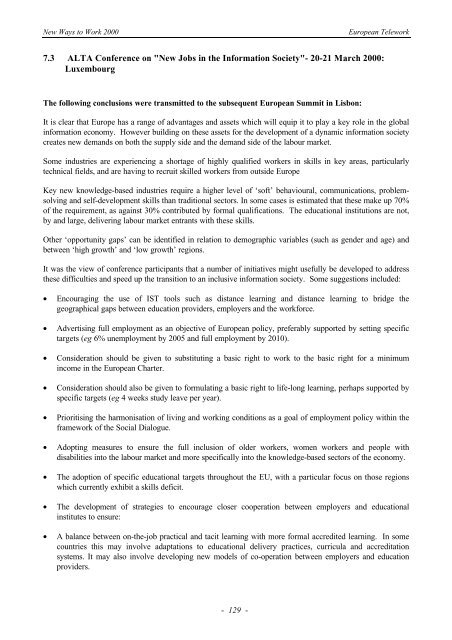eWORK 2000 - European Telework Week
eWORK 2000 - European Telework Week
eWORK 2000 - European Telework Week
- No tags were found...
You also want an ePaper? Increase the reach of your titles
YUMPU automatically turns print PDFs into web optimized ePapers that Google loves.
New Ways to Work <strong>2000</strong><strong>European</strong> <strong>Telework</strong>7.3 ALTA Conference on "New Jobs in the Information Society"- 20-21 March <strong>2000</strong>:LuxembourgThe following conclusions were transmitted to the subsequent <strong>European</strong> Summit in Lisbon:It is clear that Europe has a range of advantages and assets which will equip it to play a key role in the globalinformation economy. However building on these assets for the development of a dynamic information societycreates new demands on both the supply side and the demand side of the labour market.Some industries are experiencing a shortage of highly qualified workers in skills in key areas, particularlytechnical fields, and are having to recruit skilled workers from outside EuropeKey new knowledge-based industries require a higher level of ‘soft’ behavioural, communications, problemsolvingand self-development skills than traditional sectors. In some cases is estimated that these make up 70%of the requirement, as against 30% contributed by formal qualifications. The educational institutions are not,by and large, delivering labour market entrants with these skills.Other ‘opportunity gaps’ can be identified in relation to demographic variables (such as gender and age) andbetween ‘high growth’ and ‘low growth’ regions.It was the view of conference participants that a number of initiatives might usefully be developed to addressthese difficulties and speed up the transition to an inclusive information society. Some suggestions included:• Encouraging the use of IST tools such as distance learning and distance learning to bridge thegeographical gaps between education providers, employers and the workforce.• Advertising full employment as an objective of <strong>European</strong> policy, preferably supported by setting specifictargets (eg 6% unemployment by 2005 and full employment by 2010).• Consideration should be given to substituting a basic right to work to the basic right for a minimumincome in the <strong>European</strong> Charter.• Consideration should also be given to formulating a basic right to life-long learning, perhaps supported byspecific targets (eg 4 weeks study leave per year).• Prioritising the harmonisation of living and working conditions as a goal of employment policy within theframework of the Social Dialogue.• Adopting measures to ensure the full inclusion of older workers, women workers and people withdisabilities into the labour market and more specifically into the knowledge-based sectors of the economy.• The adoption of specific educational targets throughout the EU, with a particular focus on those regionswhich currently exhibit a skills deficit.• The development of strategies to encourage closer cooperation between employers and educationalinstitutes to ensure:• A balance between on-the-job practical and tacit learning with more formal accredited learning. In somecountries this may involve adaptations to educational delivery practices, curricula and accreditationsystems. It may also involve developing new models of co-operation between employers and educationproviders.- 129 -








